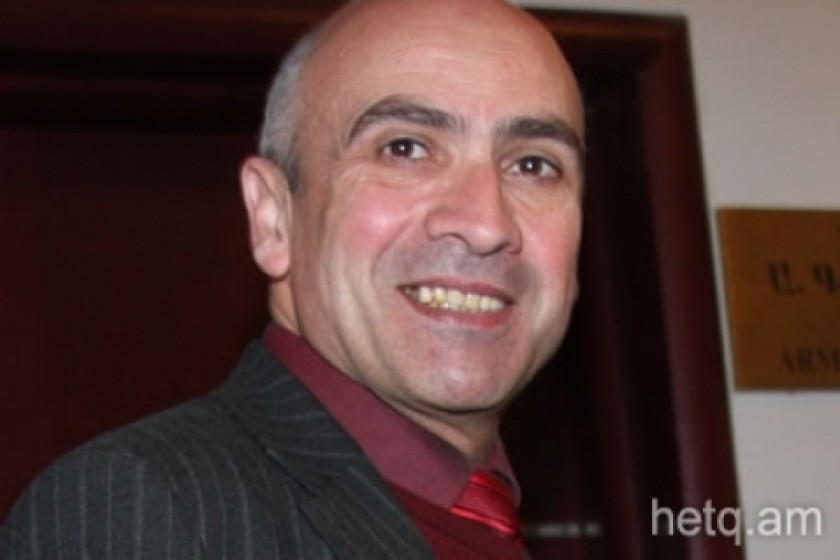
Judge Gagik Khandanyan Misses the Mark…Many Times
Did other considerations cloud his judgment in “Ijevan Mayor v Investigative Journalists” or isn’t he aware of legal precedent?
The Armenian courts have been investigating the suit brought by the Ijevan mayor against the Investigative Journalists NGO for more than two years. The suit demands an official retraction of two articles published in Hetq that the municipality claims contains slander that not only blemishes the honor of the mayor but his dignity and good name as well and harms the legal activities of the municipality.
The suit stems from a May 5, 2008 Hetq article written by Tavush correspondent Voskan Sargsyan entitled “Who is Pocketing the Profits of the Sand Mine?” and a subsequent article entitled, “Will the Three Committees Actually Notice the Illegal Exploitation of the Reservoir’s Sand?”
In the first article, Mr. Sargsyan described the illegal sand mining operation taking place at the “White Water” reservoir on the Aghstev River along the southern entrance to Ijevan. After making the full circuit of the courts, Judge Gagik Khandanyan of the Kentron and Nork-Marash District Court, on July 9, ruled in favour of the Ijevan mayor, stating that indeed the articles that originally appeared in Hetq, and which were the basis for the slander suit, contained “baseless information”. According to the sentence, at issue for the court was to answer two questions: 1) was the information published actually defamatory or not? 2) Did said information correspond to reality or not?
This circus of the absurd all started when the court violated the order of questioning – even before checking the facts the court was obliged to decide whether they were in fact defamatory or not.
The court acted in the manner it did precisely because the judge needed to see that the mayor’s dignity had indeed been defamed and so the judge had no real desire to be convinced or dissuaded regarding the veracity of the published information.
In the original Hetq articles, at issue was the illegal sand mine operation at the White Water reservoir located with the administrative borders of Ijevan.
That illegal mining was taking place at the site and that it was a lucrative business for certain individuals, the Investigative Journalists NGO proved without a shadow of a doubt, presenting an array of documentation to the court –photos, a video clip showing the dump trucks hauling the sand out and their license plate numbers, etc.
We should note that the reporter who wrote the articles in question left no stone unturned to get at the crux of the matter. In a fashion befitting the finest muckraker, he spoke to workers at the site, studied the lay of the land, questioned responsible government officials, made use of various documents, and of course used other private sources close to the matter. Reporter Voskan Sargsyan also went to the Ijevan mayor for his side of the story.
The mayor didn’t deem it necessary to talk to the reporter or acquaint him with the documents presented to the court with which the mayor sought to prove that even he had fought against the illegal mining. Based on the facts assembled, the reporter was able to arrive at a conclusion, which is his right. At the same time, the reporter’s inside sources remained anonymous. What is important is that the reporter did his job correctly, adhering to the rules of the profession. To this extent, the reporter’s actions are justified.
“The defendant cannot assume responsibility when the declaration in question is correct or when it refers to an incident of widespread public interest and when it is published in good conscience, preserving the rules of professional conduct” – this approach has been enshrined by the European Court in its 2002 decision in the case of “Kolombani v France”.
The decision states that “the court found all the arguments and claims made by the defendant’s attorney to be baseless, since they were refuted by the evidence obtained via the investigation.” The “evidence” obtained by the judge were the written statements made by the Ijevan mayor directed to the regional police that the plaintiff submitted during the court investigation.
These statements sought to certify that the mayor himself was interested in resolving the issue but that he wasn’t able to do so. Judge G. Khandanyan, not finding the arguments presented by the Investigative Journalists BGO to be reliable, started to look for an answer to the next question set before him.
The judge, in his two page decision, enumerates the RoA legal code, RoA Constitution, Declaration of International Human Rights and other international norms and clauses that declare the right of a person’s dignity to be of absolute value.
Then the judge extracts a single sentence each from the two Hetq articles (Based on our information, this business is being conducted under the supervision of Ijevan Mayor Varuzhan Nersisyan…” and “Every day scores of Ijevan cabbies who ply their trade along the pot-holed roads of the regional district center always have a few “choice words” to remember the Mayor by...”).
He did this to substantiate the argument that the mayor’s dignity was defamed in such a manner. We should note that the legal representative of the Ijevan mayor spent much time in the court to prove that the reservoir wasn’t registered as municipal property. However, all the documentation he presented proved the exact opposite; that the reservoir was municipal property and consequently, they were responsible for all activity taking place there.
Also, this documentation also sought to prove that the mayor himself had used his official powers to halt such activity. In other words, even the Ijevan Municipality accepted the fact that illegal mining of sand was taking place at White Water reservoir.
 Videos
Videos Photos
Photos
Write a comment